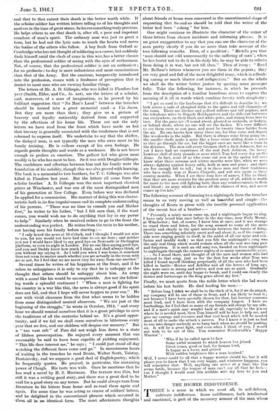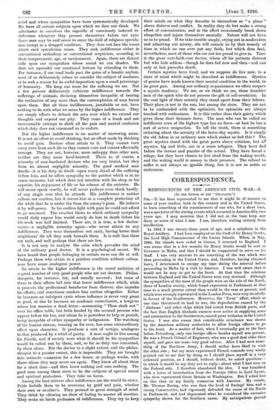THE HIGHER INDIFFERENCE.
THERE is a sense in which we must all, in self-defence, cultivate indifference. Some indifference, both intellectual and emotional, is part of the necessary armour of the man whose
mind and whose sympathies have been systematically developed. We have all certain subjects upon which we dare not think. We administer to ourselves the soporific of consciously induced in- difference whenever they present themselves before our eyes. Some men may be said never to enter the field of religious specula- tion except in a drugged condition. They dare not face the issues which such speculation raises. They seek indifference either in conventional orthodoxy or conventional scepticism, according to their temperament, age, or environment. Again, there are distant calls upon our sympathies whose sound we can deaden. We dare not squander our emotional fortune by attending to them. For instance, if our road leads past the gates of a lunatic asylum, most of us deliberately refuse to consider the subject of madness, or to seek a reason for its awful imposition upon a small percentage of humanity. We keep our tears for the suffering we see. Not a few persons deliberately cultivate indifference towards the sufferings of animals, declaring themselves incapable of bearing the realization of any more than the contemplation of man forces upon them. But all these indifferences, justifiable or not, have nothing to do with what we mean by the higher indifference. They are simply efforts to delimit the area over which we extend our thoughts and expend our pity. They come of a frank and not unreasonable attempt to shirk all the pain and mental confusion which duty does not command us to endure.
But the higher indifference is no matter of narrowing areas. It is not an effort to avoid thinking, but an effort made by thinking to avoid pain. Doctors often attain to it. They cannot turn away even from such ills as they cannot cure and cannot effectually assuage. They are not, however, more unhappy than other men, neither are they more hard-hearted. There is, of course, a minority of case-hardened doctors who are very brutal, but they form an almost negligible minority. The good medical man dwells—it is his duty to dwell—upon every detail of the suffering before him, and he offers sympathy to the patient which is in no sense insincere, but which does not interfere with his sleep or his appetite, his enjoyment of life or his scheme of the universe. He will never speak cruelly, he will never perhaps even think hardly, of any single case that he attends. His indifference is neither callous nor careless, but it serves him as a complete protection all the while that he is under fire from the enemy's guns. He induces it by will-power. In his endless fight with pain he could not afford to go unarmed. The ricochet blows to which ordinary sympathy would daily expose him would surely do him to death before his life-work was half finished. There are, it is true, a few doctor- saints—a negligible minority again—who never attain to any indifference. They wear themselves out early, having borne their neighbours' ills till they sank beneath them. It is well that there are such, and well perhaps that there are few.
It is not easy to analyse the calm which pervades the mind of the ordinary good doctor. It is a psychological secret. We have heard that people belonging to certain races can die at will. Perhaps those who attain to a painless condition without callous. ness have some analogous power.
To attain to the higher indifference is the moral ambition of a great number of very good people who are not doctors. Philan- thropists, for instance, try, and usually succeed ; but some of them in their efforts fall into that lower indifference which, while it protects the professional benefactor from distress, also impedes his efforts, and sometimes renders him useless altogether. Either be becomes an indulgent cynic whose influence is never very great or good, or else he becomes an academic correctionist, a lawgiver whose law remains a dead letter—murmuring " Thou shalt not " over his office table, but little heeded by the accused persons who appear before his bar, and whom he is powerless to help or punish, being incapable of either sympathy or indignation. The watching of the human stream, running on for ever, has some extraordinary effect upon character. It produces a sort of vertigo, analogous to that produced by a whirl of gaiety. A man ought to live among his friends, and if society were what it should be his sympathies would be called out by them, and, so far as duty was concerned, by them alone. For the doctor to a slight extent, and the philan- thropist to a greater extent, this is impossible. They are brought into intimate connexion for a few hours, or perhaps weeks, with those whom they may never see again. They know all about them for a short time—and then know nothing and care nothing. The good ones among them seem to be the subjects of special moral and spiritual protection. They take no harm.
Among the best strivers after indifference are the would-be stoics. Pride forbids them to be overcome by grief and pain, whether their own or another's. They pretend to great strength of mind. They think by allowing no show of feeling to master all emotion. They make no harsh profession of indifference. They try to keep their minds on what they describe to themselves as " a plane " above distress and conflict. In reality they do but make a strong effort of concentration, and in the effort occasionally break down altogether and injure themselves mentally. Nature will not have us to be proud. If we take trouble simply, crying out in moderation and admitting our misery, she will console us by that remedy of time in which no one ever put any faith, but which does heal, nevertheless, most of those who are not too proud to give in. Time is the great anti-faith-cure doctor, whom all his patients distrust but who fails seldom—though he does fail now and then—and can only at last prescribe death.
Certain mystics have lived, and we suppose do live now, in a state of mind which might be described as indifference. Mystics of genius have made known their mental condition to the world, to its great gain. Among our ordinary acquaintance we often suspect a mystic tendency. We see, or we think we see, those humbler men of the spirit who do not possess the gift of self-revelation. In the cool light of their serenity they stand apart from their fellows. Their place is not in the sun, but among the stars. They are not to be confounded with the optimists, for optimists are always touched with enthusiasm. It is this rather than their gaiety which gives them their dynamic force. The man who can be called an indifferent even of the highest type has no force—at best he has a sort of active resignation. To tell the truth, there is something irritating about the serenity of the latter-day mystic. Is it simply the old Adam in us ordinary men which makes us feel this ? The great mystics stand with the great poets above criticism, but all mystics, big and little, are in a sense refugees. They have fled before the terrors and puzzles of the actual. They have found a refuge, but they have chosen to live aloof from the waking world, and the waking world is uneasy in their presence. The refusal to suffer is not always an ignoble thing, but it is not so noble as endurance.



































 Previous page
Previous page